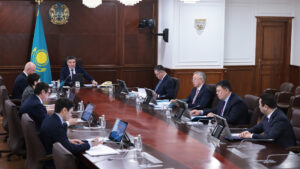ASTANA – Kazakhstan’s Prime Minister Olzhas Bektenov chaired a meeting on Feb. 11 to discuss the details of upcoming tax reforms, which include changes to the value-added tax (VAT), exemptions for agricultural producers, and measures to boost competitiveness and raise annual tax revenues by four to five trillion tenge (US$7.9 billion-US$9.9 billion). Bektenov instructed to submit tax reform amendments by Feb. 20 to the Mazhilis, the lower house of the Kazakh Parliament.

Photo credit: primeminister.kz
The country’s Deputy Prime Minister and Minister of National Economy Serik Zhumangarin provided a detailed report on the reforms. The reforms aim to simplify tax administration with a new, clearer rate structure.
The proposal includes a 16% VAT rate designed to reduce the budget’s dependence on oil revenues and allocate additional funds to priority projects.
Agricultural producers would be exempt from VAT, increasing their competitiveness. A reduced VAT rate of 10% is proposed for the healthcare sector, and discussions are ongoing about extending this to other industries.
Additionally, the VAT registration threshold will drop from 80 million tenge ($158,675) to 15 million tenge ($29,751), which, as the government said, would address the artificial fragmentation of businesses and ensure equal conditions for all companies.
The reform also revises the retail tax regime, lifting employee number restrictions and limiting sales to the B2C (business-to-consumer) segment. The expected result is an annual increase in tax revenues by four to five trillion tenge ($7.9 billion-$9.9 billion), which will help reduce reliance on the national fund, lower public debt, and channel funds into infrastructure and industry. The short-term inflationary effect is estimated to be 2.5-3%.
The proposed tax changes were also reviewed in discussions with the Atameken National Chamber of Entrepreneurs and the broader business community.
Bektenov noted that the general response to the proposals has been positive and that further consultations would take place in regional meetings with citizens.
“I will also hold meetings with businesses in Astana and in the regions. Based on the results of this work, amendments to the draft Tax Code and the accompanying bill must be submitted to the Mazhilis by Feb. 20. Then we will continue the discussion in the Mazhilis,” he said.
